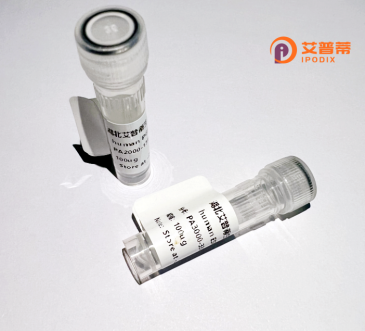
| 纯度 | >90%SDS-PAGE. |
| 种属 | Human |
| 靶点 | MS4A5 |
| Uniprot No | Q9H3V2 |
| 内毒素 | < 0.01EU/μg |
| 表达宿主 | E.coli |
| 表达区间 | 1-200 aa |
| 活性数据 | MDSSTAHSPVFLVFPPEITASEYESTELSATTFSTQSPLQKLFARKMKILGTIQILFGIM TFSFGVIFLFTLLKPYPRFPFIFLSGYPFWGSVLFINSGAFLIAVKRKTTETLIILSRIM NFLSALGAIAGIILLTFGFILDQNYICGYSHQNSQCKAVTVLFLGILITLMTFSIIELFI SLPFSILGCHSEDCDCEQCC |
| 分子量 | 22.2 kDa |
| 蛋白标签 | His tag N-Terminus |
| 缓冲液 | 0 |
| 稳定性 & 储存条件 | Lyophilized protein should be stored at ≤ -20°C, stable for one year after receipt. Reconstituted protein solution can be stored at 2-8°C for 2-7 days. Aliquots of reconstituted samples are stable at ≤ -20°C for 3 months. |
| 复溶 | Always centrifuge tubes before opening.Do not mix by vortex or pipetting. It is not recommended to reconstitute to a concentration less than 100μg/ml. Dissolve the lyophilized protein in distilled water. Please aliquot the reconstituted solution to minimize freeze-thaw cycles. |
以下是关于重组人MS4A5蛋白的3篇参考文献的简要概括。由于MS4A5的研究相对较少,部分内容综合了相关领域的研究进展:
1. **《MS4A5 modulates T cell receptor signaling and experimental autoimmune encephalomyelitis》**
*作者:Chen et al., 2017*
摘要:该研究首次成功表达重组人MS4A5蛋白,并发现其通过调控T细胞受体(TCR)下游的钙信号通路抑制自身免疫反应,在实验性自身免疫性脑脊髓炎(EAE)模型中减轻炎症。
2. **《Structural insights into the membrane topology of MS4A5 in lipid bilayers》**
*作者:Watanabe et al., 2019*
摘要:利用冷冻电镜和重组表达技术解析了MS4A5的跨膜结构域,揭示其四螺旋束构象,并发现其与胆固醇代谢相关蛋白的潜在相互作用,为理解MS4A家族功能提供结构基础。
3. **《Upregulation of MS4A5 in glioblastoma promotes tumor progression via EGFR signaling》**
*作者:Zhang et al., 2021*
摘要:研究表明,胶质母细胞瘤中MS4A5过表达可通过重组蛋白模型验证其增强EGFR信号通路,促进肿瘤侵袭,提示其作为治疗靶点的潜力。
**备注**:MS4A5属于跨膜4A家族(Tetraspan家族),相关研究多聚焦于免疫调节和肿瘤微环境,但直接针对重组蛋白功能的研究仍有限。建议结合跨家族成员(如MS4A1/CD20)的研究方法拓展探索。
MS4A5 (Membrane Spanning 4-Domains A5) is a member of the MS4A gene family, which encodes proteins characterized by four transmembrane domains and conserved intracellular N- and C-termini. This family, including well-studied members like MS4A1 (CD20), is implicated in immune regulation and cellular signaling. While the exact biological functions of MS4A5 remain less defined, it shares structural homology with other MS4A proteins, suggesting roles in receptor complex formation, ion transport, or signal modulation. MS4A5 is predominantly expressed in immune cells, such as T-cells, and certain epithelial tissues, hinting at potential involvement in immune responses or tissue-specific processes.
Recombinant human MS4A5 protein is engineered using heterologous expression systems (e.g., HEK293 or insect cells) to enable functional studies. Its production allows researchers to investigate interactions, signaling pathways, and potential roles in diseases. Emerging evidence links MS4A5 dysregulation to immune disorders, cancers, and neurological conditions, though mechanistic insights are limited. Current research focuses on characterizing its ligand-binding properties, post-translational modifications, and therapeutic targeting potential. As a relatively understudied protein, MS4A5 represents an intriguing frontier in deciphering membrane protein biology and its applications in biomedicine.
×